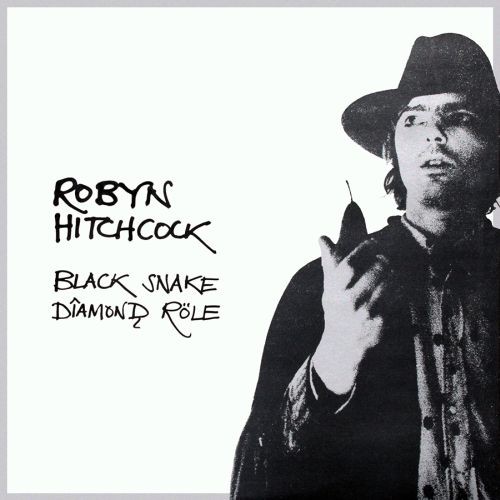 The first solo Robyn Hitchcock album, Black Snake Diamond Röle, literally opened a new world of music for me. A friend in high school declared that I’d like it, and handed me a cassette recorded from the LP. She was wrong, though. I didn’t like it, I loved it.
The first solo Robyn Hitchcock album, Black Snake Diamond Röle, literally opened a new world of music for me. A friend in high school declared that I’d like it, and handed me a cassette recorded from the LP. She was wrong, though. I didn’t like it, I loved it.
This was around 1986, and at the time I was mostly into classic rock – The Beatles in particular. I dabbled a bit in popular 80s music, but I hadn’t really gotten into alternative yet. Robyn Hitchcock was my gateway drug.
Lots of 80s alternative and indie bands have found mainstream audiences or at least have widespread name recognition. The Cure, Depeche Mode, R.E.M., etc., all went on to fill stadiums. XTC stopped touring before they could hit it big, but you still catch references to XTC in mainstream media and I hear them occasionally even in the soundtracks they pump into malls and restaurants. Robyn Hitchcock, not quite so much.
Give it to the Soft Boy
Black Snake Diamond Röle is Hitchcock’s first solo album after leaving the Soft Boys, a “neo-psychedelic” band that never quite fit in with its punk and new wave contemporaries.
Hitchcock has an unmistakable voice, something of a cross between Bob Dylan, Syd Barrett, and John Lennon. Their influences are unmistakable throughout Hitchcock’s career, but the psychedelia is especially strong on Röle.
The album wobbles into being with “The Man Who Invented Himself,” opening with a simple piano groove and cockeyed saxophone. It’s a wistful tune, full of oddball lyrics. Look for the original release, later releases are either a re-recording or remastered without the saxophone – and the song suffers for it. (By the way, what the hell happened to saxophone after the mid-80s? It’s all over the place in early 80s music, and then… poof.)
[youtube https://youtu.be/BDw7bE9MKc0]
Hitchcock follows up with “Brenda’s Iron Sledge,” which is somewhere between punk and psychedelia. I love the guitar on this one, and the throbbing bass. Please, don’t call me Reg. It’s not my name.
[youtube https://youtu.be/ckpRHX880Po]
It’s hard to say which I like more from “Do Policemen Sing?”, the stabby guitar bit that opens the song or lyrics and delivery. Or maybe it’s the jarring chorus of “our law and order’s never gonna break down!” followed by an effortless slide back into the groove.
Speaking of groove, the bass-driven track “The Lizard” has a deliciously menacing groove. This one slides by at a glacial pace, full of portent and ominousness.
[youtube https://youtu.be/TkH2zmkdNsQ]
“Meat” and “I Watch the Cars” are no-frills rockers. Lots of guitar goodness on these, and no let-up at all.
All about the bass
Pay close attention to the bass all over the album, it’s much more than just a part of the rhythm section here. Often, the bass is the heart of the song altogether, such as “Out of the Picture,” and “Acid Bird.”
Just to prove he can, Hitchcock wraps up the album with “Love,” an almost saccharine ballad that serves as a cool-down after a mostly energetic if not outright aggressive album.
Since this, Hitchcock has released something like 19 studio albums. If you’re new to his music, start here and then work your way to his later stuff.
